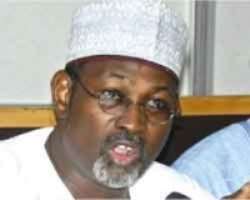INEC TO DE-REGISTER POLITICAL PARTIES - JEGA

By Dapo Akinrefon
LAGOS - CHAIRMAN of the Independent National Electoral Commission, INEC, Prof. Attahiru Jega, said, yesterday, the commission would commence de-registration of political parties that failed to secure a seat during the just conducted 2011 general elections. The process, according to him, will commence immediately the pending cases at the tribunal are concluded.
Jega said: 'The Electoral Act has provided for INEC to de-register any political party that did not win any seat. We will do it at the right time, there is a lot of litigations in the tribunal. But by the time we say a party has been deregistered, it will be a solid ground that cannot be faulted.'
Jega said these at a lecture with the theme: 'Nigeria's 2011 General Elections: The international dimensions and challenges', organised by the Nigerian Institute of International Affairs, NIIA, in Lagos.
He said the commission had stopped funding political parties owing to the removal of the legal framework that existed before now.
Said he: 'INEC is also having challenges from the 63 political parties. They wanted funding from INEC, there was a legal frame work for it in the past; they have been receiving funding in the past and now the legal frame work has been removed. We have refused to fund them and this is creating problems for us.'
He also said the commission was in the process of getting new techniques from the international community, which will aid in the success of subsequent elections in Nigeria.
He said: 'We have got a system which will help us in future elections. I want you to know that the software used by INEC was developed by some brilliant Nigerians and this software was done for free.'
The INEC chairman, however, berated those calling for the scrapping of the National Youth Service Corps scheme, saying: 'What can be done is to reform and remodify the scheme because it promotes national integration.'
Speaking further, he attributed electoral reforms to the success of the conduct of the 2011 general elections in Nigeria.
He also identified three dominant perspectives of modernization, globalization and class struggles which affects the country's electoral process, noting that 'the complex interaction between domestic politics and foreign policy is one that has been long recognized. There is no doubt that elections loom large in our domestic politics and there have implications for Nigeria's foreign policy,'
While identifying factors that almost marred the conduct of the recent poll, he said the commission remodified new innovations especially the Open Secret ballot system to achieve its aim.
He, however, stated that the commission is committed to adapting 'global principles' to improve on previously conducted elections in the country.
'The formidable challenge remaining to be addressed is how to continue to bring further improvements to the electoral process and prevent to the old order of chaotic, undemocratic and violent elections, with the attendant negative consequences of authoritarian bad governance, instead of desirable good, democratic governance,' he stated.
Contiuning, he said 'these three dominant perspectives have helped us to understand and explain the international dimensions and challenges of elections, there is in my view a new burgeoning perspective, which provides an even clearer focus and explanation what catalyzes positive democratic transitions and elections, in contemporary world.'
Speaking earlier, chairman of the event, Prince Adelusi stressed the need for voter education to prevent a reoccurrence of post election violence.
He said, 'it is important to have voters' education, we need to have a peoples' army that can cause things to happen.'
